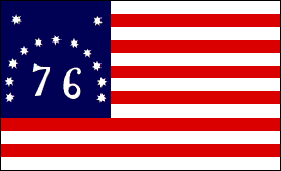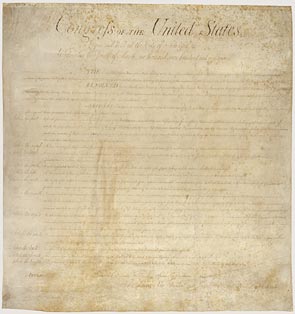Religious liberty and a thriving religious culture are defining attributes of the United States, characterizing the American order as much as its political system and market economy.[1] From the earliest settlements of the 17th century to the great social reform causes led by religious congregations in the late 19th century and again in the 20th century, religion has been a dominant theme of American life.
U.S. Historical Documents-A Chronology
The Magna Carta
1215: JOHN, by the grace of God King of England, Lord of Ireland, Duke of Normandy and Aquitaine, and Count of Anjou, to his archbishops, bishops, abbots, earls, barons, justices, foresters, sheriffs, stewards, servants, and to all his officials and loyal subjects, Greeting.
KNOW THAT BEFORE GOD, for the health of our soul and those of our ancestors and heirs, to the honour of God, the exaltation of the holy Church, and the better ordering of our kingdom, at the advice of our reverend fathers Stephen, archbishop of Canterbury, primate of all England, and cardinal of the holy Roman Church, Henry archbishop of Dublin, William bishop of London, Peter bishop of Winchester, Jocelin bishop of Bath and Glastonbury, Hugh bishop of Lincoln, Walter Bishop of Worcester, William bishop of Coventry, Benedict bishop of Rochester, Master Pandulf subdeacon and member of the papal household, Brother Aymeric master of the knighthood of the Temple in England, William Marshal earl of Pembroke, William earl of Salisbury, William earl of Warren, William earl of Arundel, Alan de Galloway constable of Scotland, Warin Fitz Gerald, Peter Fitz Herbert, Hubert de Burgh seneschal of Poitou, Hugh de Neville, Matthew Fitz Herbert, Thomas Basset, Alan Basset, Philip Daubeny, Robert de Roppeley, John Marshal, John Fitz Hugh, and other loyal subjects:
Milton Friedman-Free To Choose
The legendary PBS TV series “Free to Choose” (1980) by Nobel Prize-winning economist Milton Friedman is now available on Google Video for free (by courtesy of the Palmer R. Chitester Fund).
Conservative vs. Liberal-An exercise
Most of the debate among liberals and conservatives in the United States is over specific issues, but very little attention is given to the underlying ideals and principles behind these ideologies. We state our case to support or oppose this or that, and we argue with people who disagree, but we almost never bring the argument down to the underlying political attitudes behind our opinions. As such we often misunderstand or mischaracterize each others’ positions, and the result is deep political polarization and a virtual inability to find common ground with one another. I think that a discussion about the fundamental differences between liberalism and conservatism is well worth having.
Upton flips a switch on CFL bulbs
Three years after he led the charge to require consumers to ditch their comfortable old incandescent lights in favor of those twisty CFL bulbs, Rep. Fred Upton now wants to be the man to help undo that law as the next chairman of the House Energy and Commerce Committee.
That about-face is not unique among lawmakers looking to atone for stances they’ve taken over the past decade as they seek to gain top posts in a decidedly more conservative Republican Congress, but his reversal underscores how intent the GOP is on proving it has broken with past practices.
Cliches of Socialism
When a devotee of private property, free market, limited government principles states his position, he is inevitably confronted with a barrage of socialistic cliches. Failure to answer these has effectively silenced many a spokesman for freedom. Here are suggested answers to some of the most persistent of the “Cliches of Socialism.” These are not the only answers or even the best possible answers; but they may help someone else develop better explanations of the ideas on liberty that are the only effective displacement for the empty promises of socialism. Single-sheet reprints of each answer available at cost. Unless otherwise indicated, books noted in this volume are published by and available from the Foundation for Economic Education
God Bless Barack Obama
I suppose that heading is a bit startling coming from me this fall Sunday but I mean it. In literature, deus ex machina refers to a plot device which resolves what appears to pose an intractable problem. And, as I explain, I think Obama is ours — a character who appears out of nowhere with a cast of appointees so preposterous and an agenda so irrational and offensive to Americans that he has shocked us out of our torpor, inducing millions of us out of our comfy chairs and to the barricades.
4th Amendment, U.S. Constitution, Search & Seizure
The right of the people to be secure in their persons, houses, papers, and effects, against unreasonable searches and seizures, shall not be violated; and no Warrants shall issue but upon probable cause, supported by Oath or affirmation, and particularly describing the place to be searched, and the persons or things to be seized.
Taking Liberty-How Private Property is being Abolished in America
Taking Liberty is a comprehensive look at the lower 48 states showing, region by region,
how the Environmental Movement is rapidly abolishing Private Property in America.








